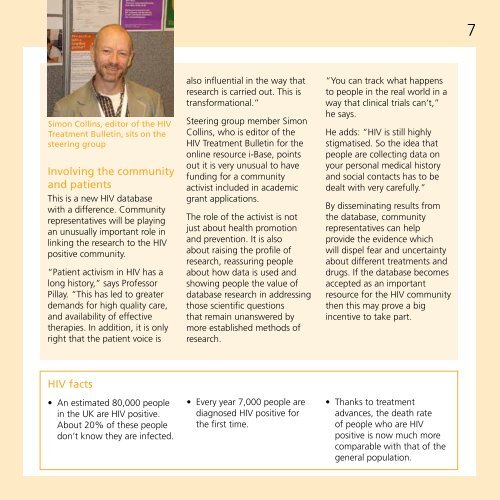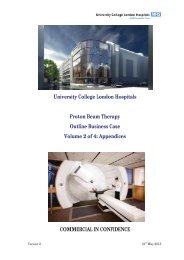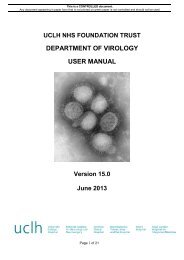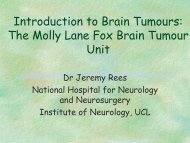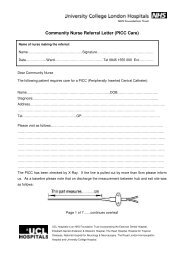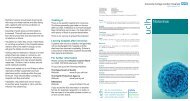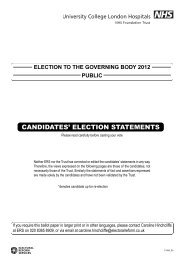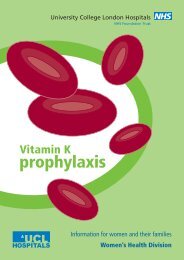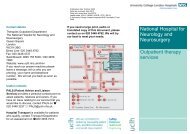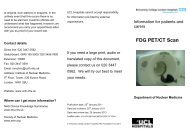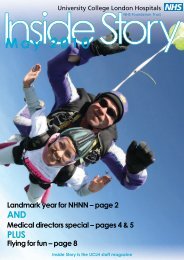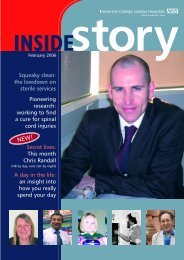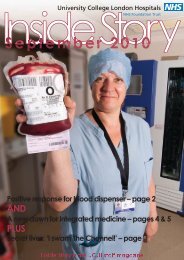How patients have helped us with our research - University College ...
How patients have helped us with our research - University College ...
How patients have helped us with our research - University College ...
You also want an ePaper? Increase the reach of your titles
YUMPU automatically turns print PDFs into web optimized ePapers that Google loves.
PATIENT CASE STUDIES 97<br />
Simon Collins, editor of the HIV<br />
Treatment Bulletin, sits on the<br />
steering group<br />
Involving the community<br />
and <strong>patients</strong><br />
This is a new HIV database<br />
<strong>with</strong> a difference. Community<br />
representatives will be playing<br />
an un<strong>us</strong>ually important role in<br />
linking the <strong>research</strong> to the HIV<br />
positive community.<br />
“Patient activism in HIV has a<br />
long history,” says Professor<br />
Pillay. “This has led to greater<br />
demands for high quality care,<br />
and availability of effective<br />
therapies. In addition, it is only<br />
right that the patient voice is<br />
also influential in the way that<br />
<strong>research</strong> is carried out. This is<br />
transformational.”<br />
Steering group member Simon<br />
Collins, who is editor of the<br />
HIV Treatment Bulletin for the<br />
online res<strong>our</strong>ce i-Base, points<br />
out it is very un<strong>us</strong>ual to <strong>have</strong><br />
funding for a community<br />
activist included in academic<br />
grant applications.<br />
The role of the activist is not<br />
j<strong>us</strong>t about health promotion<br />
and prevention. It is also<br />
about raising the profile of<br />
<strong>research</strong>, reassuring people<br />
about how data is <strong>us</strong>ed and<br />
showing people the value of<br />
database <strong>research</strong> in addressing<br />
those scientific questions<br />
that remain unanswered by<br />
more established methods of<br />
<strong>research</strong>.<br />
“You can track what happens<br />
to people in the real world in a<br />
way that clinical trials can’t,”<br />
he says.<br />
He adds: “HIV is still highly<br />
stigmatised. So the idea that<br />
people are collecting data on<br />
y<strong>our</strong> personal medical history<br />
and social contacts has to be<br />
dealt <strong>with</strong> very carefully.”<br />
By disseminating results from<br />
the database, community<br />
representatives can help<br />
provide the evidence which<br />
will dispel fear and uncertainty<br />
about different treatments and<br />
drugs. If the database becomes<br />
accepted as an important<br />
res<strong>our</strong>ce for the HIV community<br />
then this may prove a big<br />
incentive to take part.<br />
HIV facts<br />
• An estimated 80,000 people<br />
in the UK are HIV positive.<br />
About 20% of these people<br />
don’t know they are infected.<br />
• Every year 7,000 people are<br />
diagnosed HIV positive for<br />
the first time.<br />
• Thanks to treatment<br />
advances, the death rate<br />
of people who are HIV<br />
positive is now much more<br />
comparable <strong>with</strong> that of the<br />
general population.


